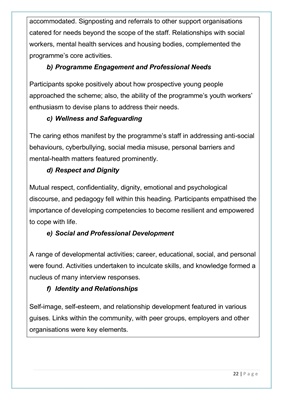
22 | P a g e
accommodated. Signposting and referrals to other support organisations
catered for needs beyond the scope of the staff. Relationships with social
workers, mental health services and housing bodies, complemented the
programme's core activities.
b) Programme Engagement and Professional Needs
Participants spoke positively about how prospective young people
approached the scheme; also, the ability of the programme's youth workers'
enthusiasm to devise plans to address their needs.
c) Wellness and Safeguarding
The caring ethos manifest by the programme's staff in addressing anti-social
behaviours, cyberbullying, social media misuse, personal barriers and
mental-health matters featured prominently.
d) Respect and Dignity
Mutual respect, confidentiality, dignity, emotional and psychological
discourse, and pedagogy fell within this heading. Participants empathised the
importance of developing competencies to become resilient and empowered
to cope with life.
e) Social and Professional Development
A range of developmental activities; career, educational, social, and personal
were found. Activities undertaken to inculcate skills, and knowledge formed a
nucleus of many interview responses.
f) Identity and Relationships
Self-image, self-esteem, and relationship development featured in various
guises. Links within the community, with peer groups, employers and other
organisations were key elements.